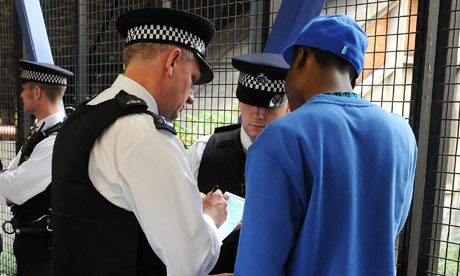Anti-terror stop and search powers to be scrapped
![]()

The police’s use of controversial counterterrorism stop and search powers against individuals is to be scrapped immediately, the home secretary announced today. Under section 44 of the Terrorism Act 2000, officers can stop and search anyone in a designated area without having to show reasonable suspicion. Interim operational guidelines to be issued to the police say that in future section 44 powers will be used only to search vehicles, and officers will have to have grounds for suspecting they are being used in connection with terrorism.
Section 44 stop and search powers were used on more than 148,798 occasions last year and have been a key element in the campaign against terrorism. The home secretary’s decision to scrap their use against individuals follows a ruling by the European court of human rights in January that the powers were unlawful because they were too broadly drawn and lacked sufficient safeguards to protect civil liberties.
The Strasbourg case was brought by peace protester Kevin Gillan and a journalist, Pennie Quinton, who were unlawfully abused when police stopped and searched them on their way to a demonstration outside the annual Excel centre arms fair in east London in 2003.
In an unexpected statement to the Commons today, May said she had taken urgent legal advice and consulted the police since the Strasbourg ruling was confirmed as final last Wednesday. “In order to comply with the judgment, but avoid pre-empting the review of counter-terrorism legislation, I have decided to introduce interim guidelines for the police,” the home secretary told the Commons.
“I am therefore changing the test for authorisation for the use of section 44 powers from requiring a search to be ‘expedient’ for the prevention of terrorism, to the stricter test of it being ‘necessary’ for that purpose. And, most importantly, I am introducing a new suspicion threshold.”
She added: “Officers will no longer be able to search individuals using section 44 powers. Instead they will have to rely on section 43 powers, which require officers to reasonably suspect the person to be a terrorist. And officers will only be able to use section 44 in relation to the searches of vehicles. I will only confirm these authorisations where they are considered to be necessary, and officers will only be able to use them when they have ‘reasonable suspicion’.”
The changes are designed to comply with the Strasbourg ruling and provide clarity for the police before a review of all counterterrorism legislation this summer. The terms of reference for the review are expected to be announced next week.
May’s announcement was attacked by Alan Johnson, the former Labour home secretary, who said he was amazed she had not tried to appeal against the ruling. He warned the reforms would restrict the powers of the police.
May said concerns about the use of section 44 powers meant she would not have appealed against the judgment, even if it had been possible to do so. “We have always been clear in our concerns about these powers,” she said.
Shami Chakrabarti, director of the human rights group Liberty, said: “Liberty welcomes the end of the infamous section 44 stop and search power that criminalised and alienated more people than it ever protected. We have argued against it for 10 years and spent the last seven years challenging it in courts all the way to the court of human rights.
“It is a blanket and secretive power that has been used against school kids, journalists, peace protesters and a disproportionate number of young black men. To our knowledge, it has never helped catch a single terrorist. This is a very important day for personal privacy, rights to protest and race equality in Britain.”
The home secretary also confirmed she had consulted the Northern Ireland secretary about the changes in the use of the powers in advance of the traditional marching season.
Related Articles
Pueblos Indígenas contra la mercantilización de la tierra
![]()
En el Día Internacional de los Pueblos Indígenas El 9 de agosto se celebra un año más el Día Internacional
Thousands of Indonesian women trafficked to Hong Kong face exploitation and risk domestic “slavery”
![]()
There are more than 300,000 migrant domestic workers in Hong Kong, with about half from Indonesia and nearly all are
Mexican Senate must end impunity for armed forces’ human rights violations
![]()
Mexico’s military justice system is failing victims of alleged human rights violations by the army and navy. © Arturo Pérez


